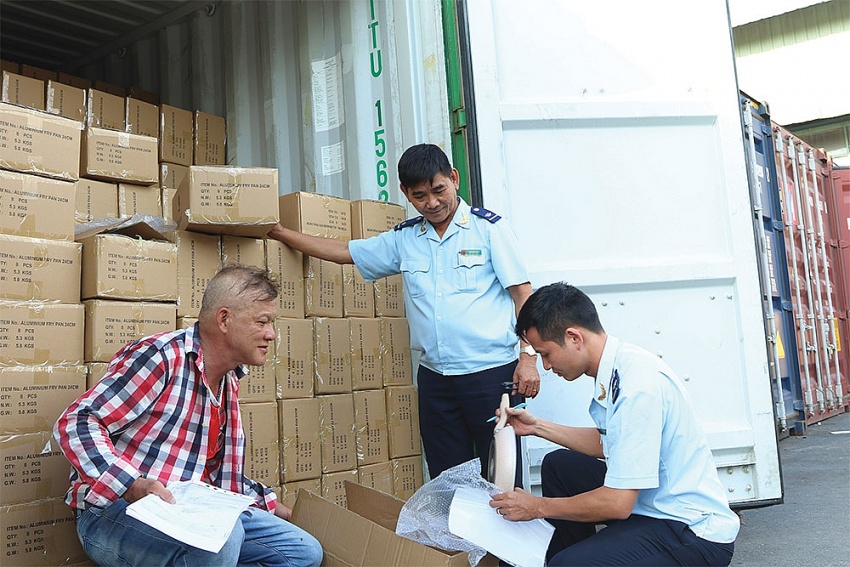Latest drive to phase out red tape begins
The Government Office last week released a conclusion from the seventh meeting of the government’s Steering Committee on Administrative Reform. The conclusion underlined that the government, ministries, and localities must “remove all unnecessary business conditions” as soon as possible.
“Ministries and sectors are required to take the initiative in researching and reviewing all business conditions, and proposing the removal of conditional business conditions in the sectors that can apply other more effective management solutions. This task has to be completed before June because it is very urgent,” the conclusion stated.
“They are also ordered to promptly review and propose the eradication of business conditions that are unnecessary, infeasible, unclear, difficult to determine, and unsuitable to the reality. Also, they have to annul all unnecessary certificates, and reduce certificates overlapped in content, and this task has to be completed in Q2 of 2024,” the conclusion continued.
 |
| Latest drive to phase out red tape begins, illustration photo Le Toan |
The government in 2024 has set out a mission in boosting administrative reform to “create new values, new impetuses, and new success”, with the public and enterprises being the biggest beneficiaries. Efforts are to be made to remove and decrease at least 10 per cent of compliance costs for administrative procedures and business regulations.
In 2024, the government will complete all decentralising administrative procedures that are subject to the power of the government and prime minister, ensuring that at least 70 per cent of public services will be provided online and the rate of people performs such services will be at least 40 per cent. Last year, the government cut, reduced, and simplified 340 business regulations; simplified 390 administrative procedures; and decentralised 156 procedures.
With such efforts, the government has achieved some achievements in public financial reforms. Specifically, state budget revenue exceeded about 8.12 per cent of the estimate, while exempting, reducing, extending taxes, fees, charges, and land rental of nearly $8.2 billion. At the same time, the government increased revenues and saved expenses, and set aside about $23.63 billion to contribute to resources that will be used for salary reform in the 2024-2026 period.
Disbursement of public investment capital hit $27.96 billion, the highest ever, reaching about 93 per cent of the initial plan. This is nearly $5.2 billion higher in absolute terms compared to 2022.
However, according to the General Statistics Office, in 2023, just over 89,000 businesses halted operations – up 20.7 per cent as compared to the previous year. Some 65,500 enterprises stopped operations and waited for dissolution procedures – up 28.9 per cent; and 14,400 enterprises completed such procedures.
According to the the American Chamber of Commerce (AmCham) in Hanoi, some regulations continue to introduce new administrative procedures such as licensing, approvals, and heavy reporting requirements. For example, there is still uncertainty and a lack of clarity regarding the requirements to obtain work permits for foreigners. AmCham encourages the government to clarify those elements of Vietnamese law that hinder the efficient deployment of foreign investment, and that any additional administrative burdens in draft laws and regulations be carefully considered and avoided whenever possible.
Meanwhile, Marko Walde, chief representative of AHK in Vietnam, Myanmar, Cambodia, and Laos, said that German businesses are boosting their presence in Vietnam both in direct investment and indirect investment. However, challenges remain.
“While mergers and acquisitions are an effective strategy for German companies aiming to enter or expand in the Vietnamese market, they may encounter certain challenges from a German perspective,” Walde said. “These challenges include cultural differences, legal and regulatory hurdles, due diligence complexities, and issues related to intellectual property and post-acquisition integration.”
 | Foreign-invested enterprises' export turnover accounts for 73 per cent Foreign-invested enterprises (FIEs) contributed $259.95 billion out of Vietnam’s total export turnover of $355.5 billion in 2023, equalling 73.1 per cent. |
 | Enterprises make efforts to ensure Tet employee bonus Companies have found headroom to offer workers bonuses for the Lunar New Year break – even those with falling order numbers and bleak business results. |
 | Foreign-invested enterprises in Bac Giang to recruit thousands of employees Several foreign-invested enterprises in the northern province of Bac Giang want to recruit dozens of thousands of employees to expand their operations. |
What the stars mean:
★ Poor ★ ★ Promising ★★★ Good ★★★★ Very good ★★★★★ Exceptional
Related Contents
Latest News
More News
- State corporations poised to drive 2026 growth (February 03, 2026 | 13:58)
- Why high-tech talent will define Vietnam’s growth (February 02, 2026 | 10:47)
- FMCG resilience amid varying storms (February 02, 2026 | 10:00)
- Customs reforms strengthen business confidence, support trade growth (February 01, 2026 | 08:20)
- Vietnam and US to launch sixth trade negotiation round (January 30, 2026 | 15:19)
- Digital publishing emerges as key growth driver in Vietnam (January 30, 2026 | 10:59)
- EVN signs key contract for Tri An hydropower expansion (January 30, 2026 | 10:57)
- Vietnam to lead trade growth in ASEAN (January 29, 2026 | 15:08)
- Carlsberg Vietnam delivers Lunar New Year support in central region (January 28, 2026 | 17:19)
- TikTok penalised $35,000 in Vietnam for consumer protection violations (January 28, 2026 | 17:15)

 Tag:
Tag:




















 Mobile Version
Mobile Version